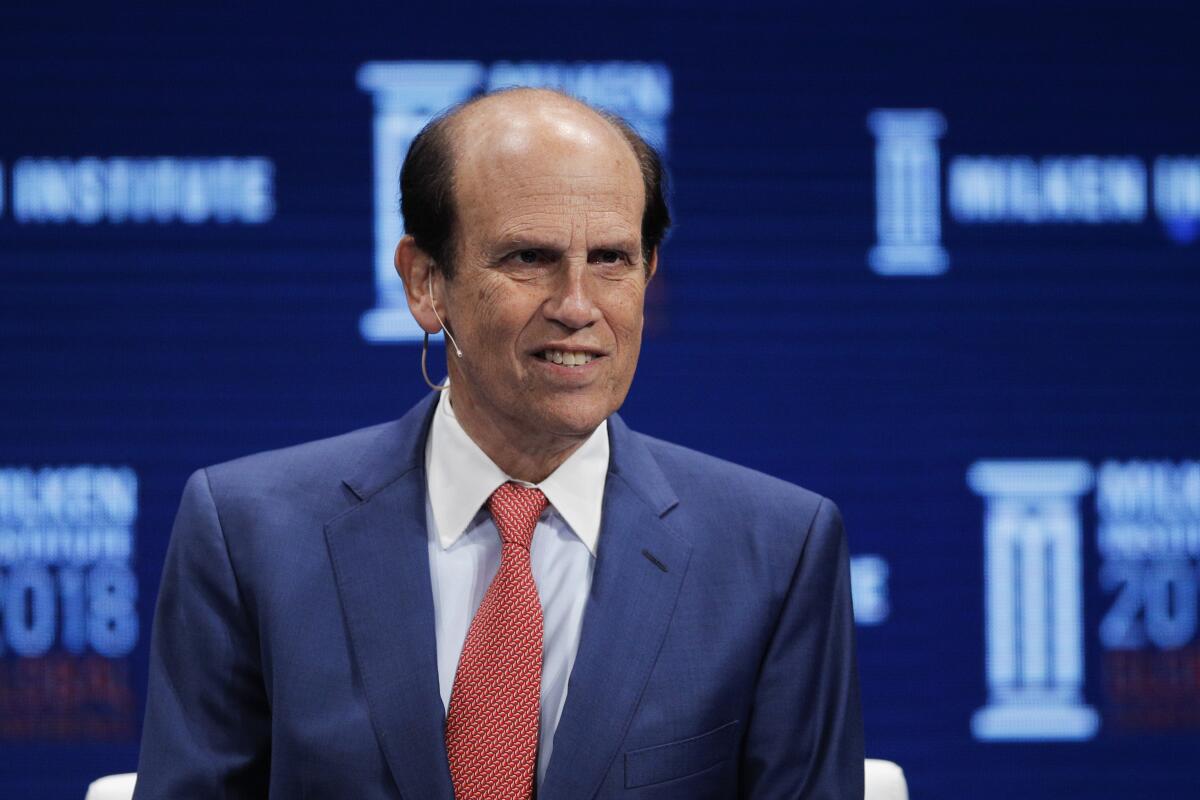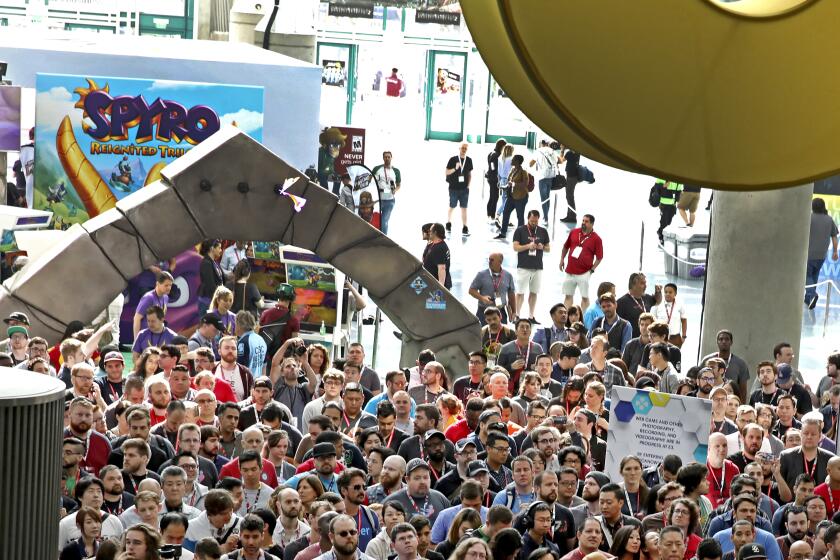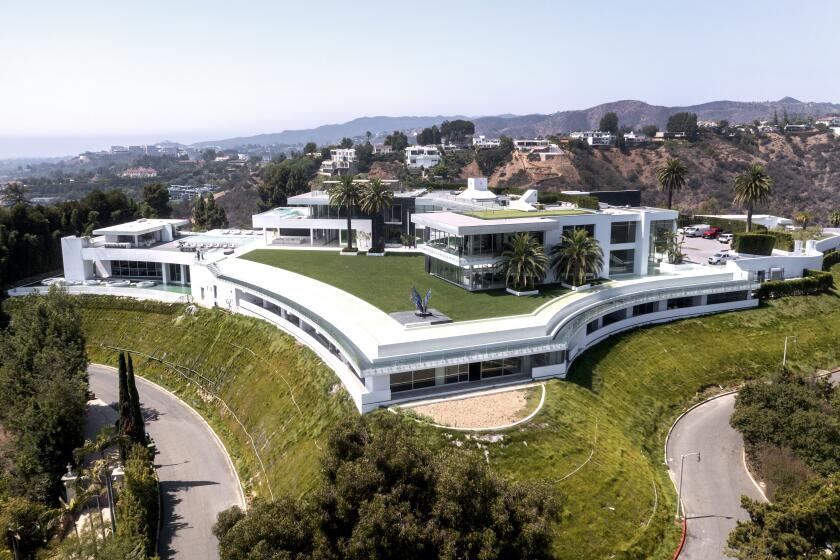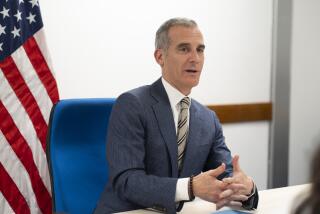Financiers return to Beverly Hills for Milken conference — this time with masks and proof of vaccination

- Share via
Call it a leading business indicator.
Once again, some of Wall Street’s wealthiest financiers and other luminaries are descending on the Beverly Hilton hotel this week for a Milken Institute Global Conference — a year after COVID-19 forced them to participate virtually from behind their desks. But like much else in the pandemic era, it’s not quite what it was before.
A vaccine is required for entrance; attendance is capped at half the usual 5,000; a virtual option is available; and inside the tony hotel, the look should be more masked ball than power gathering, given face-covering mandates.
Still, tourism officials say the return of the live event to Beverly Hills is a heartening sign, despite the unexpected complications caused by the Delta coronavirus variant.
“Delta threw a little bit of a curveball for everybody, but I think people are starting to put their toes in the water,” said Julie Wagner, chief executive of the Beverly Hills Conference & Visitors Bureau. “Group business is starting to come back.”
Though Delta variant thwarted expectations of workers flocking back to offices this fall, office leasing in L.A. County rises as businesses look ahead.
The four-day conference begins Sunday with a series of invitation-only events, then formally kicks off Monday morning with remarks about the state of the global economy and the prospects for full recovery by Scott Minerd, chief investment officer of Guggenheim Partners; Julie Gerberding, executive vice president of Merck, which has a COVID-19 viral medication before the Food and Drug Administration; and John Gerzema, chief executive of the Harris Poll.
Like at previous conferences, the theme is topical: “Charting a New Course” will look at how “the disruptions and innovations of the recent past can be reframed for a thriving future.”
More than 180 sessions will include such topics as how fintech can increase social mobility, the disparate effects of climate change, food sustainability, affordable housing and beating future superbugs. Some 600 speakers are scheduled.
Aside from the vaccine requirements, COVID-19 protocols require attendees to wear CDC-approved masks indoors, except when speaking on panels or eating or drinking in designated areas. They must also provide a negative PCR or antigen test taken within 72 hours of attending the conference and wear visible badges showing vaccine and test status. Doctors and medical personnel will be on hand.
“We spent a lot of time and energy — and consulted with experts — to design an environment that reflects local and federal guidelines and provides for the safety for our attendees, speakers and staff,” Chad Clinton, the institute’s director of media relations, said in an email. “We’ve intentionally capped attendance at a level approximately half as large as in years prior as part of safety protocols and have hit the maximum number we wanted.”
Convention centers in California are eager to reopen. But it may be a while before visitors are ready to return in large numbers.
The Beverly Hills affair follows by one month a similar event held at the Javits convention center in New York. The SALT conference, affiliated with Anthony Scaramucci’s SkyBridge Capital, had previously been held in Las Vegas. Last month, it drew some 2,500 attendees to New York and 1,500 virtually, which the conference said was a combined record. Although vaccinations were required, masks were not at all times, though many networking events were held on a rooftop pavilion.
Jennifer Prosek, New York-based managing partner at public relations firm Prosek, will be attending Milken, where her firm will hold an outdoor cocktail party at Mosaic Hotel Beverly Hills. Prosek knows of people who have gone to Milken in the past who are not attending this year but said she was comforted by her decision to be a panelist at the SALT conference.
“It was [thousands] at the Javits Center, which I have to say, did scare me a bit. I actually moderated a panel there, but it was such a good experience,” she said. “So the good news is that our [Milken event] has always been outside. That’s the nice thing about L.A., right? It’s poolside.”
The return of conventions to Southern California is welcome news for the tourism industry, though the business is still not what it was.
Doane Liu, executive director of the city of Los Angeles Department of Convention and Tourism Development, said the Los Angeles Convention Center is hosting three big conferences this month, each with thousands of participants, a high number of events even before the pandemic.
However, attendance is a third to half what it typically is at the conferences, which cater to head and neck physicians, Linux software engineers and mobile tech industry leaders.
“We feel really excited to see people in the building again. It’s a good indicator that things are starting to come back, but what’s not back to normal is the number of attendees,” he said.
The idea was simple: Nile Niami would build and sell The One, the biggest and most extravagant new home in the country. Then things went sideways.
It’s hard to know when normality will settle in, given how many people don’t want to fly or attend large gatherings. One good sign: the Biden administration‘s decision to open the U.S. border to vaccinated international visitors starting Nov. 8.
Next year, the Los Angeles Convention Center is expected to once again host the popular E3 video game conference and its largest convention, the Anime Expo, which draws more than 100,000 visitors, Liu said.
However, there will be obstacles. Liu said he has heard of staffing challenges affecting vendors that provide electricians, lighting technicians , food vendors and other services crucial to conferences.
The Milken conference is typically held in the spring but last year was delayed and held virtually in October. Clinton said the plan for next year is to hold the event in the spring once again.
More to Read
Inside the business of entertainment
The Wide Shot brings you news, analysis and insights on everything from streaming wars to production — and what it all means for the future.
You may occasionally receive promotional content from the Los Angeles Times.














